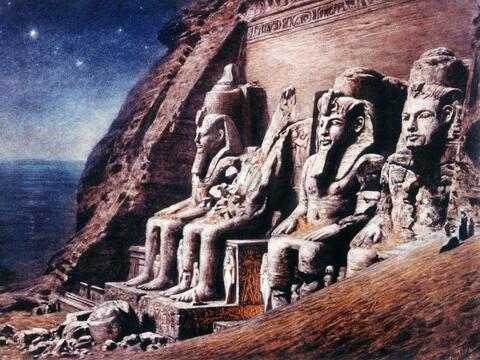HUMS 005, The Ancient Egyptian Empire of the New Kingdom

Course Description:
For most of the duration of the New Kingdom (1550-1069 BCE), the ancient Egyptians were able to establish a vast empire and became one of the key powers within the Near East. This course is an introduction to the history, archaeology and literary sources of one of the most dynamic periods of ancient Egyptian history. We investigate the development of Egyptian foreign policies and military expansion, which affected parts of the Near East and Nubia to the south. We also examine and discuss topics such as ideology, imperial identity, political struggle and motivation for conquest and control of wider regions surrounding the Egyptian state as well as the relationship to other powers and their perspective on Egyptian rulers, as, for example, described in the famous Amarna letters, the world’s earliest diplomatic correspondence. Throughout the semester, we consider the different sources that have survived in the archaeological and textual record for understanding Egypt’s first empire within its ancient geopolitical context.
As a result of this course you will be able to:
- Critically assess primary source materials (ancient Egyptian texts) within their historical setting
- Explain the political strategies the ancient Egyptians employed to take control of neighbouring regions
- Evaluate Egypt’s political role among its neighbor states in the ancient Near East
- Prepare and present a research poster (of the type given at professional conferences)
- Virtually visit museum worldwide for a short research paper on a relevant object
- Have a good grasp of ancient Egyptian pharaohs and their achievements within Egypt
- Discuss the motivation of Egypt for expanding its boundaries
- Analyze the various factors shaping Egypt’s internal and external politics
This course might be of particular interest for those of you who like history, archaeology and ancient civilizations. Course materials will come in form of readings, podcasts, videos, 3D tours of sites and objects.
Led By:

|
Professor Nadine MoellerNadine Moeller is Professor of Near Eastern Languages and Civilizations at Yale with a focus on Egyptian Archaeology and Egyptology. Her main research interests include settlement archaeology and urbanism in ancient Egypt, household archaeology and climate change in antiquity. She is author of The Archaeology of Urbanism in Ancient Egypt (Cambridge 2016), and co-editor together with Karen Radner (LMU Munich) and Dan Potts (NYU/ISAW) of the Oxford History of the Ancient Near East (Oxford 2020-), a five-volume project to replace the ‘Cambridge Ancient History’. She also co-edited a volume on the latest research results about the Hyksos ruler Khayan together with Irene Forstner-Müller (ÖAI) entitled The Hyksos Ruler Khyan and the Early Second Intermediate Period in Egypt: Problems and Priorities of Current Research (2018). In Egypt she has been directing the ongoing excavations at Tell Edfu together with Gregory Marouard since 2010, and she also participated in numerous excavations and fieldwork projects at other sites in Egypt such as Abu Rawash, Memphis, Dendara, Theban West Bank, Valley of the Kings, and Elephantine. She received her Ph.D. from the University of Cambridge (Christ’s College 2004) and held the Lady Wallis Budge Junior Research Fellowship at University College, Oxford (2004-2007). Her previous appointment was Associate Professor of Egyptian Archaeology at the Oriental Institute and the Department of Near Eastern Languages and Civilizations at the University of Chicago (2007-2020). In 2018 she was the recipient of the Llewellyn John and Harriet Manchester Quantrell Award for Excellence in Undergraduate Teaching. |